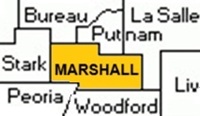FRISBEY, Loton
Loton FRISBEY, residing on section 6, Henry
township, Marshall
county, is the oldest living settler in the northern part of the
county, having been a continual resident of the vicinity in
which he lives for a period of sixty-one years. In fact he has
lived on the same section of land the entire period of time, and
on his present farm for sixty years. At the time of his
settlement here – just three years after the close of the Black
Hawk war – the inhabitants wee few and far between, and he had
but two or three neighbors within a reasonable distance from his
cabin. Benijah MALLORY, an uncle of his wife, lived on the place
now owned by Mrs. HARNEY, and Colonel Henry SNIDER moved in the
next year.
Loton FRISBEY is a native of Vermont, that state which
was the birthplace of Stephen A. Douglas, the “Little Giant,”
who beat Lincoln in the race for the senate in 1858, but who was
beaten by “Honest Old Abe: for the presidency two years later.
Of his native state Douglas
often humorously remarked that “it was a good state to be born
in if you only emigrated soon enough.” Mr. FRISBEY was born in
the village
of Middletown, Rutland county, October 15, 1807. He grew to
manhood, receiving but a limited education in the primitive
subscription schools, and at the age of twenty-three married
Miss Rhoda MALLORY. Five years later he fully made up his mind
that Vermont was a good enough state to be born in, but that if
he would prosper as he most earnestly desired, he must seek
other fields where the opportunity for advancement was much
greater. Illinois, the far-famed
prairie state, was then favorably spoken of by emigrants from
the east, who had penetrated its wilderness, and here he
determined to come. The wisdom of his choice is not to be
questioned, for no state ever gave greater evidence of what the
future would be, and none has more fully redeemed the prophecies
made of it by its friends.
On reaching Marshall county, Mr. FRISBEY determined here
to “set his stakes,” and that time would be illy spent in
looking farther. The change from the green mountains of
Vermont to the wide prairies of
Illinois, then so thinly settled and so
far from the markets of the world, was great indeed. But the
“Rubicon” was crossed, and with a stout heart and willing hands
he went to work to make for himself and family a home in what
was then the far west. In this undertaking he was ably assisted
by his young wife, and toiling and suffering together they lived
to see the wild prairie blossom as the rose, and neighbors
gathered thickly around them, while evidences of civilization
sprang up on every hand. But life was not all a burden. There
came to gladden their home from time to time children, seven in
number, of whom six are now living, as follows: Amanda, wife of
Asa PUTNAM, of Madelia, Minnesota;
Eliza, now Mrs. CULVER, of Minnesota; Hiram, of Wabasha, that
state; Elvira, wife of Henry BORLAND, also of Madelia,
Minnesota, and Henry, of the same place. It will be seen that
all of the children have left the home nest and are now living
in Minnesota.
After some thirty-eight years of a joyous
wedded life, the mother was called to her heavenly reward,
leaving behind a precious memory that is hallowed by those who
remain. One year later Mr. FRISBEY married Mrs. Rachel MOTHERAL,
of Bureau county, Illinois, a native of Ohio, and a daughter of
Paul and Elizabeth (LAUGHREY) RILEY. When she was but eight
years of age her parents removed to Bureau county, locating
where the
village of Sheffield now stands. There she grew to
womanhood and married William MOTHERAL, and by that union were
born six children, of whom five are yet living. The children
were Elizabeth, widow of Charles STUDLEY, of
Neponset, Illinois;
Martha, widow of Samuel CONANT, of Van Meter, Iowa; Lavina, wife of Adam NORTON, of Westboro, Missouri;
James V., of Webster City, Iowa; Emma, who married Henry
FRISBEY, and died, leaving one child, who is now deceased, and
Jennie, wife of George BIEDLEMAN, of Kewanee, Illinois. In 1857,
Mr. MOTHERAL removed with his family to Anderson county,
Kansas, took up a claim, and one year
later died. Soon after his death his widow returned to Bureau
county, Illinois,
and was residing in the vicinity of her old home when she
married Mr. FRISBEY.
Our subject and his wife, while yet
residing on the old farm, are practically living retired,
renting the farm and making their home with the family. Few men
of his age are so well preserved, and few now living have
witnessed so many and so great changes. When he settled in this
locality, what is now
Marshall
and Putnam counties, were then Putnam county alone. Chicago, which now has one million, seven
hundred and fifty thousand inhabitants, was then an
insignificant village with but a few hundred people. Railroads
were then unknown here and the means of transportation were of a
primitive order. In early life he was a whig of the old school,
and since the organization of the republican party he has voted
that ticket.
Extracted March 2011 by Norma Hass from
The Biographical Record of Bureau, Marshall and Putnam Counties, Illinois,
1896.
Browse ILGenWeb




